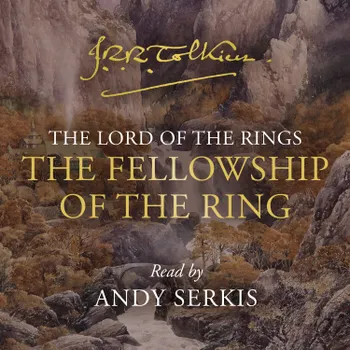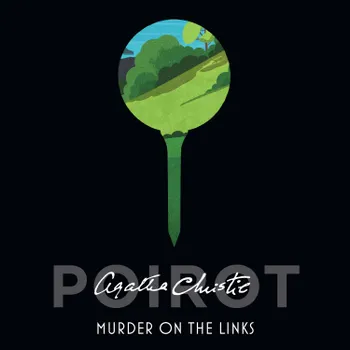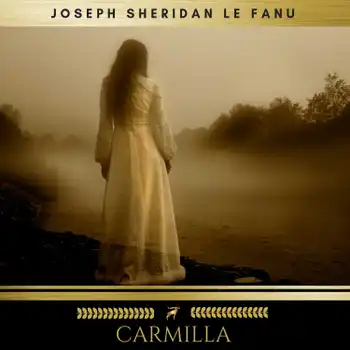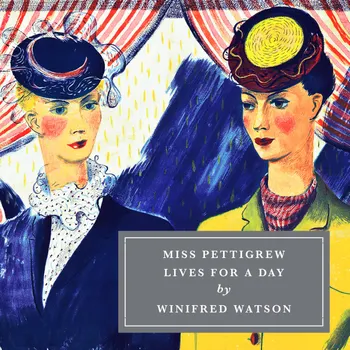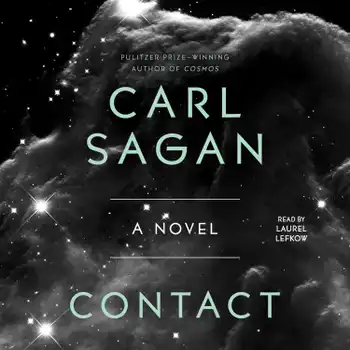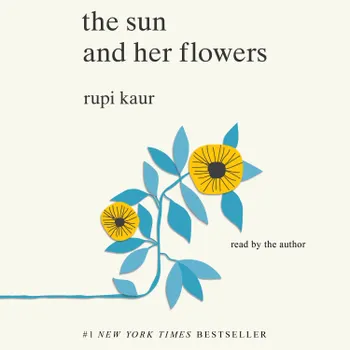Check off your bucket list! Timeless classics and legendary characters—all in one place. Whether you're drawn to literary giants or searching for a poetic masterpiece, you'll find the most popular classics here.
Top list: Classics and poetry
Fahrenheit 451 : A Novel
A new recording of Ray Bradbury’s timeless classic Fahrenheit 451 narrated by Penn Badgley!
Nearly seventy years after its original publication, Ray Bradbury’s internationally acclaimed novel Fahrenheit 451 stands as a classic of world literature set in a bleak, dystopian future. Today its message has grown more relevant than ever before.
Guy Montag is a fireman. His job is to destroy the most illegal of commodities, the printed book, along with the houses in which they are hidden. Montag never questions the destruction and ruin his actions produce, returning each day to his bland life and wife, Mildred, who spends all day with her television “family.” But when he meets an eccentric young neighbor, Clarisse, who introduces him to a past where people didn’t live in fear and to a present where one sees the world through the ideas in books instead of the mindless chatter of television, Montag begins to question everything he has ever known.
Voyager
Diana Gabaldon’s magnificent historical saga, begun with Outlander and Dragonfly in Amber, continues with this New York Times bestseller. Set in the intriguing Scotland of 200 years ago, the third installment in the romantic adventures of Jamie and Claire is as compelling as the first.
Now that Claire knows Jamie survived the slaughter at Culloden, she is faced with the most difficult decision of her life. She aches to travel back through time again to find the love of her life, but, in order to do that, she must leave their daughter behind. It has been 20 years since she and
Jamie were forced to separate. Can she risk everything, maybe even her life, on a gamble that their love has withstood the long, rigorous test of time?
The Picture of Dorian Gray (Unabridged)
The Picture of Dorian Gray is a Gothic and philosophical novel by Oscar Wilde, first published complete in the July 1890 issue of Lippincott's Monthly Magazine. Fearing the story was indecent, the magazine's editor deleted roughly five hundred words before publication without Wilde's knowledge. Despite that censorship, The Picture of Dorian Gray offended the moral sensibilities of British book reviewers, some of whom said that Oscar Wilde merited prosecution for violating the laws guarding public morality. In response, Wilde aggressively defended his novel and art in correspondence with the British press, although he personally made excisions of some of the most controversial material when revising and lengthening the story for book publication the following year.
Dorian Gray is the subject of a full-length portrait in oil by Basil Hallward, an artist impressed and infatuated by Dorian's beauty; he believes that Dorian's beauty is responsible for the new mood in his art as a painter. Through Basil, Dorian meets Lord Henry Wotton, and he soon is enthralled by the aristocrat's hedonistic world view: that beauty and sensual fulfilment are the only things worth pursuing in life.
1984
Published in 1948, this cautionary tale follows a lone protagonist who struggles under the rule of a repressive totalitarian government. Set in a future version of England, called Airstrip One, the novel is famous for its imagined language that conjures a cruelly cynical authoritarian regime. One of the most popular novels in the English language, it is part political thriller and part science fiction, and it established the word Orwellian to describe official deception, unwarranted surveillance, and revisionist history by the state.
B. J. Harrison Reads Deathworld
Jason dinAlt is a professional gambler who travels between different worlds in the universe. Right now, he is gambling on the planet Cassylia. One day, he meets the ambassador of Pyrrus – the most hostile world in the universe. Kerk, the ambassador, offers dinAlt money to run a stake up for him. After Jason finally wins the needed amount, he tries to escape with the money, but gets captured.
Why did Kerk offer money to dinAlt and not to someone else? What are his real intentions? Who is the gambler going to play with and how much will he win? Who will capture him and for what reason?
Find all the answers in Harry Harrison’s "Deathworld" from 1960.
B. J. Harrison started his Classic Tales Podcast back in 2007, wanting to breathe new life into classic stories. He masterfully plays with a wide array of voices and accents and has since then produced over 500 audiobooks. Now in collaboration with SAGA Egmont, his engaging narration of these famous classics is available to readers everywhere.
Harry Max Harrison (1925 - 2012) was an American science fiction writer. He is best known for The Stainless-Steel Rat, a character he created. However, Harrison began his career as an illustrator and editor, working together with Wally Wood. Harry’s first short story named "Rock Diver" was published in 1951. Some of his popular titles are "Make Room! Make Room!", "Soylent Gree" and "Bill the Galactic Hero".
The Fellowship of the Ring
This brand-new unabridged audio book of , the first part of J. R. R. Tolkien’s epic adventure, , is read by the BAFTA award-winning actor, director and author, Andy Serkis.The Fellowship of the RingThe Lord of the Rings
In a sleepy village in the Shire, a young hobbit is entrusted with an immense task. He must make a perilous journey across Middle-earth to the Cracks of Doom, there to destroy the Ruling Ring of Power – the only thing that prevents the Dark Lord Sauron’s evil dominion.
Thus begins J. R. R. Tolkien’s classic tale of adventure, which continues in and .The Two TowersThe Return of the King
Whose Body? : The Lord Peter Wimsey Mysteries, Book 1
Dive into the intriguing world of Whose Body?, Dorothy Sayers' brilliant debut in the Lord Peter Wimsey series. When a mysterious body is discovered in a bathtub, wearing only a pair of spectacles, the case seems destined to remain unsolved. But Lord Peter Wimsey, a sophisticated amateur detective, takes on the challenge, unraveling clues and exposing hidden motives in a story filled with suspense and clever twists.
This captivating audiobook immerses listeners in a classic British mystery, showcasing Sayers' talent for intricate plotting and sharp dialogue. Perfect for fans of golden age detective fiction, Whose Body? promises a gripping experience from start to finish.
Think and Grow Rich
Think and Grow Rich is a motivational personal development and selfhelp book written by Napoleon Hill and inspired by a suggestion from ScottishAmerican businessman Andrew Carnegie. While the title implies that this book deals only with how to achieve monetary wealth, the author explains that the philosophy taught in the book can be used to help individuals do or be almost anything they want in this world. For instance, Jim Murray (sportswriter) wrote that Think and Grow Rich was credited for Ken Norton's boxing upset of Muhammad Ali in 1973. The book was first published in 1937 during the Great Depression. At the time of Hill's death in 1970, Think and Grow Rich had sold 20 million copies. It remains the biggest seller of Napoleon Hill's books a perennial bestseller after 70 years (BusinessWeek Magazine's BestSeller List ranked Think and Grow Rich as the sixth bestselling paperback business book 70 years after it was first published). Think and Grow Rich is listed in John C. Maxwell's A Lifetime Must Read Books List.
The Flowers of Evil / Les Fleurs du Mal : English - French Bilingual Edition
Les Fleurs du mal (English: The Flowers of Evil) is a volume of French poetry by Charles Baudelaire. First published in 1857, it was important in the symbolist and modernist movements. The poems deal with themes relating to decadence and eroticism.
This Bilingual English - French edition provides the original text by Baudelaire and its English translation by Cyril Scott.
The initial publication of the book was arranged in six thematically segregated sections:
1. Spleen et Idéal (Spleen and Ideal)
2. Tableaux parisiens (Parisian Scenes)
3. Le Vin (Wine)
4. Fleurs du mal (Flowers of Evil)
5. Révolte (Revolt)
6. La Mort (Death)
Baudelaire dedicated the book to the poet Théophile Gautier, describing him as a parfait magicien des lettres françaises ("a perfect magician of French letters").
The foreword to the volume, Au Lecteur ("To the Reader"), identifying Satan with the pseudonymous alchemist Hermes Trismegistus.
The author and the publisher were prosecuted under the regime of the Second Empire as an outrage aux bonnes moeurs ("an insult to public decency"). As a consequence of this prosecution, Baudelaire was fined 300 francs. Six poems from the work were suppressed and the ban on their publication was not lifted in France until 1949. These poems were "Lesbos"; "Femmes damnées (À la pâle clarté)" (or "Women Doomed (In the pale glimmer...)"); "Le Léthé" (or "Lethe"); "À celle qui est trop gaie" (or "To Her Who Is Too Joyful"); "Les Bijoux" (or "The Jewels"); and " Les "Métamorphoses du Vampire" (or "The Vampire's Metamorphoses"). These were later published in Brussels in a small volume entitled Les Épaves (Scraps or Jetsam).
On the other hand, upon reading "The Swan" (or "Le Cygne") from Les Fleurs du mal, Victor Hugo announced that Baudelaire had created "un nouveau frisson" (a new shudder, a new thrill) in literature.
In the wake of the prosecution, a second edition was issued in 1861 which added 35 new poems, removed the six suppressed poems, and added a new section entitled Tableaux Parisiens.
A posthumous third edition, with a preface by Théophile Gautier and including 14 previously unpublished poems, was issued in 1868.
The Murder on the Links
An urgent cry for help brings Poirot to France…
An urgent cry for help brings Poirot to France. But he arrives too late to save his client, whose brutally stabbed body now lies face downwards in a shallow grave on a golf course.
But why is the dead man wearing his son’s overcoat? And who was the impassioned love-letter in the pocket for? Before Poirot can answer these questions, the case is turned upside down by the discovery of a second, identically murdered corpse…
Diamonds are Forever : A James Bond Novel
USING HIS FORMIDABLE SKILLS OF DECEPTION, JAMES BOND WORKS TO TAKE DOWN AN AMERICAN GANG
The Spangled Mob are no ordinary American gangsters.
They prey on the addictions of the wealthy and treat the poor as collateral. Their ruthless desire for power and fierce brotherly loyalty make them deadly and invincible.
Now James Bond must go deep undercover in his urgent new assignment: to destroy their millionaire masterminds, Jack and Seraffimo Spang.
But the Spangs’ cruel influence is everywhere, from dusty African diamond mines to the frenzied gambling dens of Las Vegas. Can Bond find his men before his cover is blown?
Carmilla
Carmilla is a Gothic novella by Joseph Sheridan Le Fanu. First published in 1871 as a serial narrative in The Dark Blue, it tells the story of a young woman's susceptibility to the attentions of a female vampire named Carmilla. Carmilla predates Bram Stoker's Dracula by 26 years, and has been adapted many times for cinema.
The Last Man
The Last Man is a post-apocalyptic science fiction novel by Mary Shelley, which was first published in 1826. The book tells of a future world that has been ravaged by a plague. The novel was harshly reviewed at the time, and, except for a 1924 silent film based on it, was virtually unknown – having been eclipsed by Shelley's more popular works – until a scholarly revival in the 1960s. It contains semi-biographical portraits of Romantic figures in Shelley's circle, particularly Shelley's late husband Percy Bysshe Shelley and Lord Byron.
Miss Pettigrew Lives for a Day
Set in 1930s London, Winifred Watson’s Miss Pettigrew Lives for a Day recounts twenty-four hours in the life of a governess who turns up for a very unexpected first day at work. Watson’s comedic, light-hearted novel is read by Academy Award-winning actress Frances McDormand, who plays Miss Pettigrew in the 2008 film production.
Middle-aged governess Guinevere Pettigrew visits her employment agency one morning and is mistakenly sent to the glitzy home of a nightclub singer. Miss Pettigrew meets the glamorous Miss Delysia LaFosse and embarks on a whirlwind adventure. These two very different women soon become friends, and Miss Pettigrew proves to be the perfect companion. Instead of having to look after unruly children, Miss Pettigrew spends her evening at a party. But what will happen when the day finally ends?
Miss Pettigrew Lives for a Day is part of the Persephone Audiobook Collection, a series of forgotten classics including neglected fiction and non-fiction by women writers. First published in 1938, this edition includes a preface by author and retired academic Henrietta Twycross-Martin.
Contact
The Pulitzer Prize-winning author of Cosmos and renowned astronomer Carl Sagan’s international bestseller about the discovery of an advanced civilization in the depths of space remains the “greatest adventure of all time” (Associated Press).
The future is here…in an adventure of cosmic dimension. When a signal is discovered that seems to come from far beyond our solar system, a multinational team of scientists decides to find the source. What follows is an eye-opening journey out to the stars to the most awesome encounter in human history. Who—or what—is out there? Why are they watching us? And what do they want with us?
One of the best science fiction novels about communication with extraterrestrial intelligent beings, Contact is a “stunning and satisfying” (Los Angeles Times) classic.
The Sun Also Rises
2007 Audie Award Finalist for Classics
Originally published in 1926, The Sun Also Rises is Ernest Hemingway’s first novel and a classic example of his spare but powerful writing style.
A poignant look at the disillusionment and angst of the post-World War I generation, the novel introduces two of Hemingway’s most unforgettable characters: Jake Barnes and Lady Brett Ashley. The story follows the flamboyant Brett and the hapless Jake as they journey from the wild nightlife of 1920s Paris to the brutal bullfighting rings of Spain with a motley group of expatriates. In his first great literary masterpiece, Hemingway portrays an age of moral bankruptcy, spiritual dissolution, unrealized love, and vanishing illusions.
“The ideal companion for troubled times: equal parts Continental escape and serious grappling with the question of what it means to be, and feel, lost.” —The Wall Street Journal
Siddhartha
Siddhartha is one of the great philosophical novels. Profoundly insightful, it is also a beautifully written story that begins as Siddhartha, son of an Indian Brahman, leaves his family and begins a lifelong journey towards Enlightenment. On the way he faces the entire range of human experience and emotion: he lives with ascetics, meets Gotama the Buddha, learns the art of love from Kamala the courtesan, and is transformed by the simple philosophy of the ferryman Vasudeva whose wisdom comes not from learned teachings but from observing the River. Herman Hesse (1877-1962) was a German-Swiss novelist, poet, and painter. He was awarded the Nobel Prize in Literature in 1946.
The Sun and Her Flowers
Rupi Kaur performs the first-ever recording of the sun and her flowers, her second #1 New York Times bestselling collection of poetry and prose. This production was recorded in 2021 along with the brand-new audio edition of milk and honey and the debut audio recording of home body.
Divided into five chapters, this volume is a journey through the life cycle of wilting, falling, rooting, rising, and blooming. It is a celebration of love in all its forms.
Pretty Boys Are Poisonous : Poems
Megan Fox showcases her wicked humor throughout a heartbreaking and dark collection of poetry. Over the course of more than seventy poems Fox chronicles all the ways in which we fit ourselves into the shape of the ones we love, even if it means losing ourselves in the process.
“These poems were written in an attempt to excise the illness that had taken root in me because of my silence. I’ve spent my entire life keeping the secrets of men, my body aches from carrying the weight of their sins. My freedom lives in these pages, and I hope that my words can inspire others to take back their happiness and their identity by using their voice to illuminate what’s been buried, but not forgotten, in the darkness,” says Fox.
Pretty Boys Are Poisonous marks the powerful debut from one of the most well-known women of our time. Turn the page, bite the apple, and sink your teeth into the most deliciously compelling and addictive books you’ll read all year.
Animal Farm
In "Animal Farm," George Orwell employs allegorical storytelling to critique totalitarianism and explore the intricacies of power dynamics, class struggle, and societal corruption. Set on a seemingly idyllic farm, the narrative follows the rebellion of the animals against their oppressive human owner, only to witness the emergence of a new tyranny. Through a straightforward yet poignant prose style, Orwell masterfully intertwines fable-like simplicity with deeply resonant political commentary, echoing the tumultuous events of the Russian Revolution and the rise of Stalinism. This book serves as a cautionary tale about the usurpation of revolutionary ideals and the ease with which noble intentions can devolve into despotism. George Orwell, born Eric Arthur Blair, was profoundly influenced by his experiences in colonial India and the Spanish Civil War, which fueled his commitment to social justice and opposition to authoritarian regimes. His keen observations of societal inequalities and political machinations inspired him to pen "Animal Farm" during a time when fascism and communism posed significant threats to democratic values. Orwell's keen intellect and lived experiences illuminate the allegories within this literary work. Recommended for readers seeking a concise yet impactful exploration of the perils of power and betrayal of ideals, "Animal Farm" remains an essential reading not only for its historical significance but also for its timeless reflection on human nature and governance. Orwell's narrative invites readers to reflect critically on their own societal structures, making it a profound commentary on the eternal struggle for freedom and equity.





